Rally the Trends – March
A monthly round-up of digital marketing, SEO, and social media updates, summarized for you.

Oh, hi there. Welcome to the eleventh edition of Rally the Trends! Thanks for visiting this highlight reel of digital marketing news and social media updates. We’re so glad you stopped by.
SEO
Not Just Pass(age)ing Through: Passages, a recent update to Google’s algorithm, is being deployed, and it is a shift in the search engine’s ranking system. Rather than ranking pages as a whole, specific sections of a page’s content will be reviewed. Google has said that Passages affects 7% of all queries, and your website might need adjustments in order to maintain ranking placement and traffic. Read up on how you can optimize your site for Google Passages.
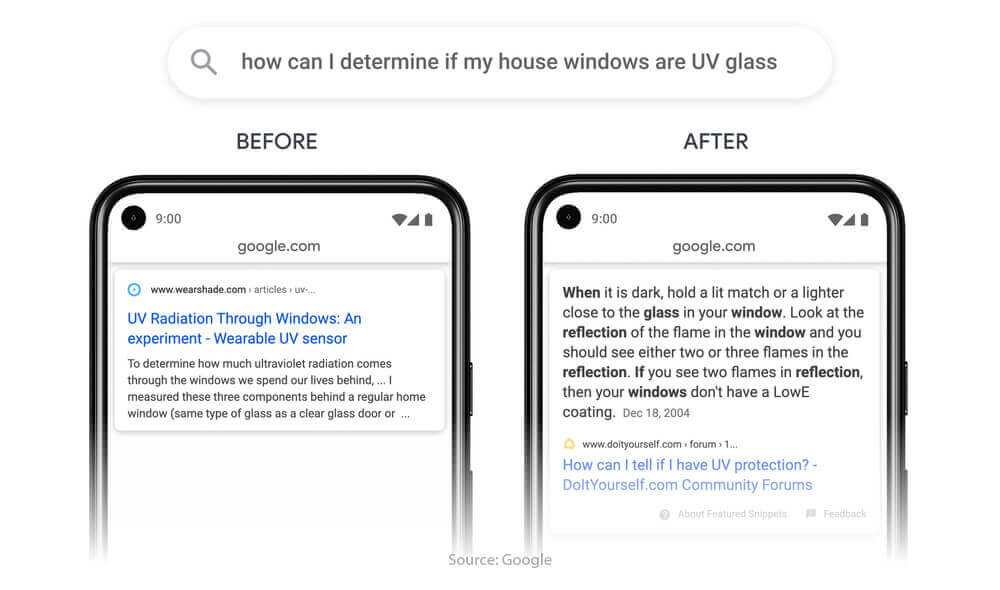
Safety First: For Google Ads. Google recently released their Ads Safety Report, which is designed to prevent and deter ads that are malicious or misleading. In 2020, over 3 billion ads were blocked or removed. Google monitors ads for safety and to prevent the spread of false or harmful information, and they also use their findings to inform future practices. This work is continuously improving and ongoing, and Google’s team uses these steps to guide the process:
- Human reviewers identify and label policy-violating ads.
- Engineers create machine learning models using the policy-violating ads to identify signals of malicious behavior.
- The system uses the machine learning models based upon the network signals they’ve identified to flag similar ads.
- Models are continuously improved over time.
Digital Marketing
Privacy Practice: Data privacy is continuing to gain importance with consumers, with more than 20% globally choosing to abandon or reduce their use of a brand due to its privacy practices. This is according to the information from a new study performed by The Conference Board in conjunction with Nielson. In the U.S. in particular, information privacy is even more valued, with over 57% of consumers rejecting personalization in the name of defending their privacy. Data privacy regulations are becoming more stringent, with GDPR, the phase-out of cookies, and the arrival of opt-in approval for IDFA. While some consumers (45%) fear a data breach, others (39%) fear that their information could be shared with other brands. Perhaps the biggest factor with consumers’ fear in sharing their data is not understanding how the process works. Only 39% responded that they were knowledgeable about how their data was pulled and used by a brand. Moving forward, digital marketers will certainly have more challenges in acquiring data for personalization, but they will also gain opportunities to educate consumers on the data collection process and its benefits for improving their experiences online.
Social Media
Happy Doomscrolling: This past month marked an unfortunate epoch for the world: the Paniversary, or pandemic anniversary. While that is not a cause for celebration, it is certainly a cause for reflection. One of the most convenient tools for staying connected at a distance during the pandemic has been social media. 2020 was certainly a year of increased screen time, with the average American spending 82 minutes per day on social media. That is a seven-minute jump per day from the previous year. Increased use, however, did not see increased posting; with most people at home (you can only post so many photos of your WFH set up), grid posts on Instagram, for example, saw a decline. TikTok’s short form video style and addictive app design was created for such a time as this and saw explosive growth during the pandemic. While social media has been rightfully labeled as a tool used to spread misinformation and hate, it is also used for good purposes, like educating people on the BIPOC experience and true allyship, as well as sharing funny dog videos that give a much-needed hit of serotonin during dark days. Short-form content like Stories and TikTok (and its imitators) are probably here to stay. Also, as this year has brought a realignment of priorities, the casual, imperfect sharing trend has made a comeback. This return to the roots of social media reminds us why it was created and adopted originally – sharing real life photos and experiences, not the perfectly planned aesthetic grid of color-coordinated photos. Have your social media habits changed during the pandemic?

Source: Impact Photography via Shutterstock
Freestylin’ with Facebook: Cause it’s totally the coolest kid in town, right? Facebook, through its New Product Experimentation (NPE) arm, has introduced a platform for rapping and freestyling called BARS. In the style of TikTok, it is designed for short, 60-second-max videos. It includes features like auto-tune and a dictionary for rhyming. After recording in the app, the user can share their fresh beat across social media platforms. BARS is in the early stages of testing right now, and there is a waitlist for general users looking to download. Early feedback hasn’t been great, with some users finding the platform less than intuitive.
Her Business: With March being Women’s History Month, Facebook published a report around gender imbalance, as well as a guide to supporting female-owned businesses and amplifying the voices of women and underrepresented groups. Progress has certainly been made in the gender pay gap, but a significant disparity still exists. Especially relevant is the fact that during the pandemic thus far, women lost one million more jobs than men did.
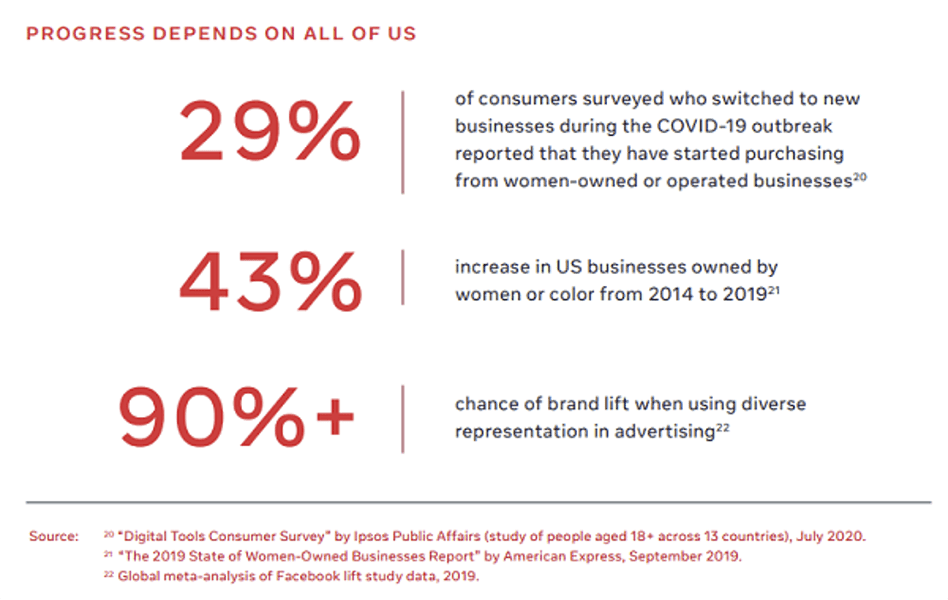
The Likes of You: May have been temporarily hidden. Earlier this month, Instagram had a bit of a snafu when its ongoing test of hiding like counts was widely expanded due to a bug. While like counts were restored within a few hours, the reactions by Instagram users gave some insight into what would happen if Instagram ever tried to do something like that permanently. Some totally freaked out, instantly missing the validation of likes, while others applauded the effort to eliminate likes for the purposes of mental health and wellbeing. Still others brought up the fact that well-liked posts garner more likes, especially for influencers and creators who make an income from Instagram. Loss of a like count is not news in some other countries where the rollout of this test has been in play since 2019. However, if the feature is ever taken away permanently, the death of this overarching vanity metric will certainly see a shift in how IG posts are viewed and valued.
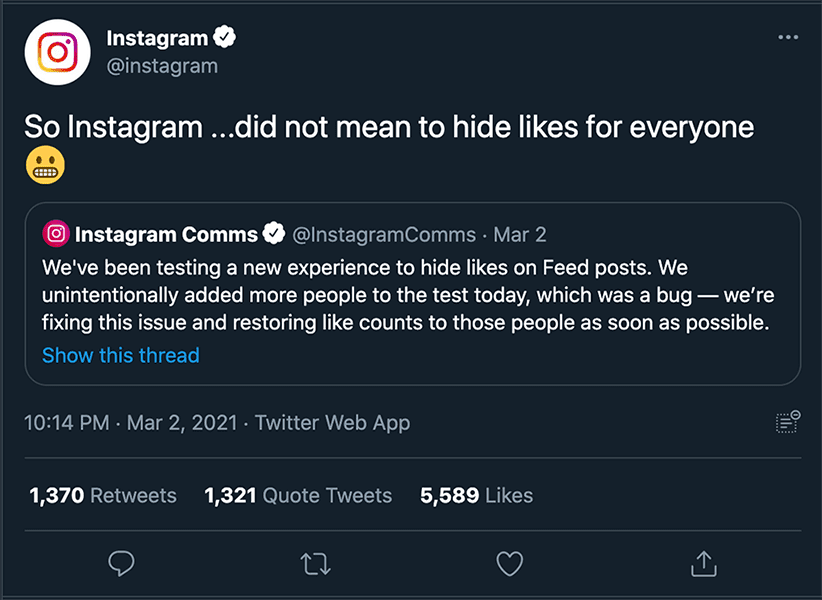
Source: Instagram Twitter
**Applause**: Instagram is testing a “Closed Caption” sticker for Stories. This feature would auto-generate captions for your Stories with a range of font options. To ensure accessibility for their content, influencers and Instagram users have begun regularly adding text that summarizes what they are saying in Stories and videos. This also allows users to click through Story slides and read the content even with the sound off. Many Instagram users have the platform’s separate app, Threads, to create videos with auto-captions and then upload to Instagram or TikTok. Automated captions have been available in IGTV since September of last year. While there is no official release date for this feature, the testing seems to be in advanced stages, so it should be available soon.
Super Follow: Twitter announced the Super Follow feature as part of its upcoming rollout. Twitter users will be able to charge followers in exchange for providing extra content. This monthly subscription model could be bonus content, access to a group, subscriber-only newsletter, or some combination of them all. This model is reminiscent of Patreon, where creators usually have some content available for free on a public platform (podcasts, YouTube, etc.), but then create additional content that is only available behind a paywall. This is also an opportunity for Twitter to increase and diversify its struggling revenue streams.
Chirp Analysis: Twitter unveiled a number of new projects that are in the works at its recent Analyst Day for investors. The company is looking to join in on the eCommerce rush, and several new shopping options were revealed. These are still in development, but you can be assured that they are a priority for Twitter. Also revealed on Analyst Day was the preview for a new business account format on the platform. The example of a new business profile, pictured below, includes a default blue checkmark, business category, business information (hours of operation, etc.), and several other elements. Twitter also shared that an “Automated Account” tag is in development, which will identify bot accounts and what or who they are engaging with.
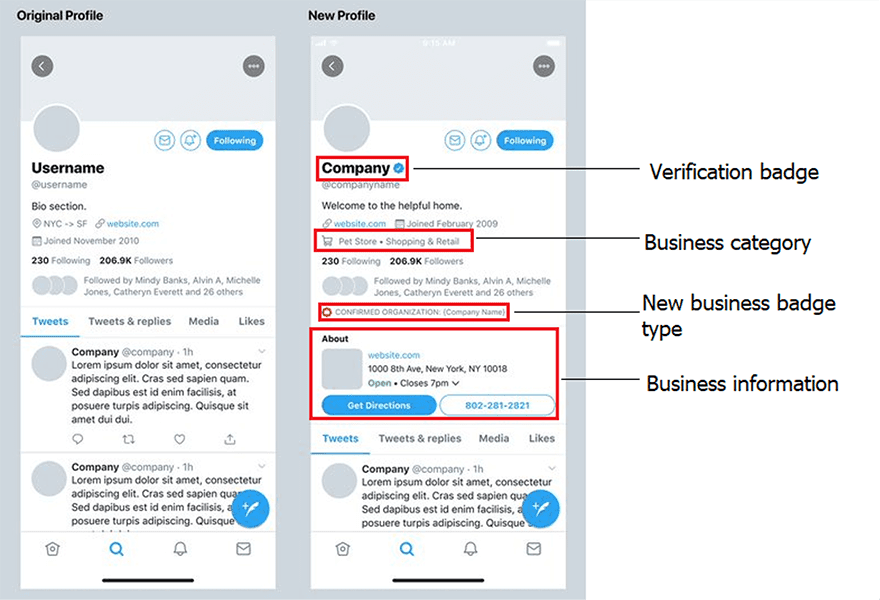
Source: Matt Navarra via Twitter
5,4,3,2,1: How long you would have to retract a tweet before it is sent into the world. Twitter users have long bemoaned the lack of an edit button to correct pesky typos, but the platform has not given in. The only way to “edit” is to delete and start over. Now, the platform is testing an “Undo” option. While this “Undo” feature is not exactly an edit button, it does give the Tweeter 5 seconds to recall what they just sent. That extra time could certainly help users do one last spellcheck, but it also gives more time to consider the content of the message. This is similar to the prompts Twitterusers receive when retweeting or resharing before reading an article.
Linked and Loaded: LinkedIn is adding some new tools to assist with organic promotion and sharing among coworkers. Page admins can collect content to suggest to fellow employees for sharing options. Link sharing with the swipe up feature on Stories is also now available for all business pages. In addition, LinkedIn unveiled Product pages and the opportunity to incorporate Lead Generation forms from those pages for free.
Connecting B2B, B2C, and B2F: Business to Freelancers. LinkedIn is developing a new platform called Marketplaces that is created to connect businesses and freelancers for hiring opportunities. This would include a payment element within the platform to make it an easy transaction for both businesses and freelancers. Marketplaces would be expanding on LinkedIn’s ProFinder tool, which is a way for users to search for freelance and gig workers by topic.
A-Town Shoutout
Our hearts are heavy for ATL this week as we mourn the lives lost in the spa shootings. We grieve with the families and communities of those who were killed, as well as the entire AAPI community that is experiencing grief, anger, fear, shock, and a range of other emotions. This and other tragic events like it continue to shed light on Asian hate in the U.S. Stay strong, ATL.❤️
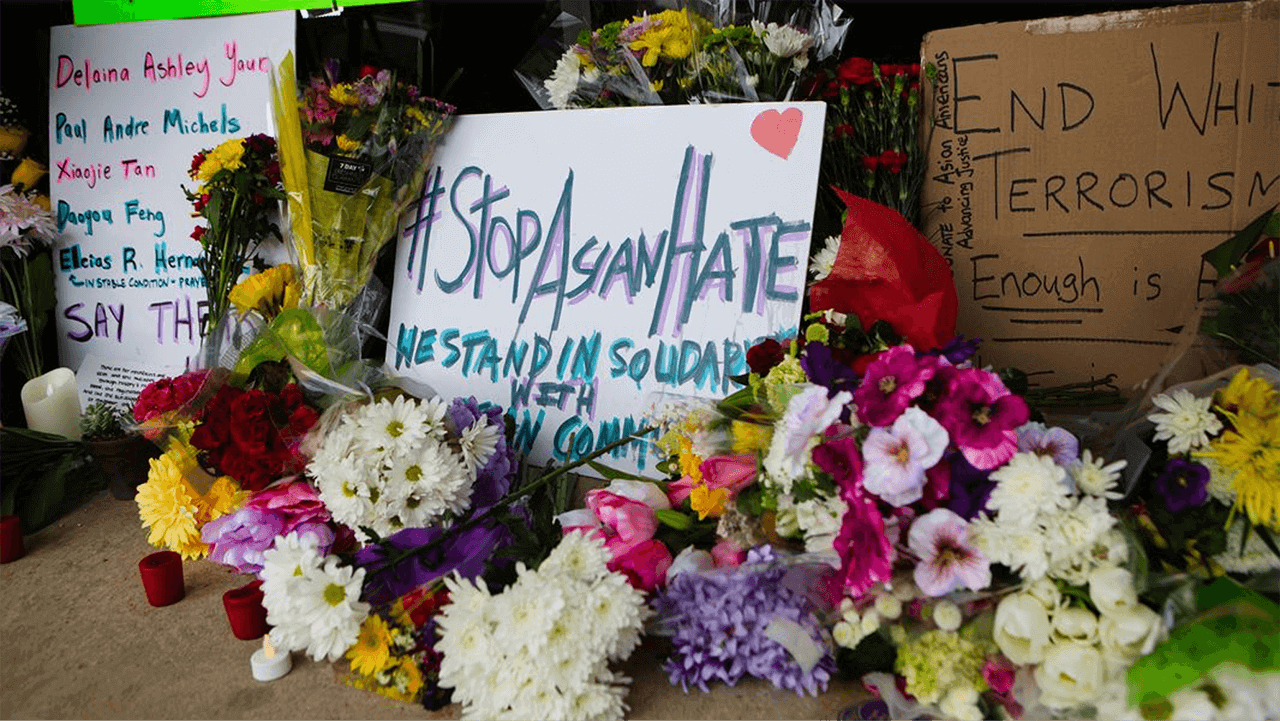
Source: AJC
Be safe. Take time to take care of yourself. Happy Women’s History Month! Remember that allergy season doesn’t last forever. Thanks for reading to the end. See you next month. 👋🏼👋🏾👋🏿










